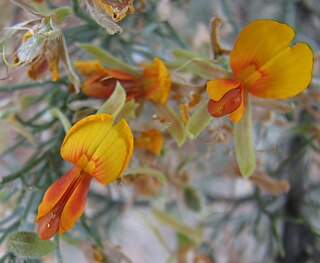
Jacksonia furcellata, commonly known as grey stinkwood, is a species of flowering plant in the family Fabaceae and is endemic to the south-west of Western Australia. It is a prostrate to low-lying, or weeping erect shrub with greyish-green branches, sharply-pointed side branches, its leaves reduced to scales leaves, yellowish-orange flowers, and woody, hairy pods.

Jacksonia sericea, commonly known as waldjumi, is a species of flowering plant in the family Fabaceae and is endemic to the south-west of Western Australia. It is a spreading to prostrate shrub with greyish-green branches, straight, sharply-pointed side branches, leaves reduced to scales, orange flowers with red markings, and woody, densely hairy pods.

Jacksonia anthoclada is a species of flowering plant in the family Fabaceae and is endemic to the south-west of Western Australia. It is an erect, single-stemmed shrub with hairy, elliptic to egg-shaped phylloclades with sharply-pointed edges, yellow-orange flowers with red markings, and hairy, woody pods.

Jacksonia aculeata is a species of flowering plant in the family Fabaceae and is endemic to the northern Australia. It is a spreading shrub with sharply-pointed, hairy, short side branches, leaves reduced to scales, lemon-yellow flowers, and woody, hairy pods.

Jacksonia angulata is a species of flowering plant in the family Fabaceae and is endemic to the south-west of Western Australia. It is a tufted, spreading to prostrate shrub often with zig-zagged branches, sharply-pointed side branches or phylloclades, leaves reduced to broadly egg-shaped scales, yellow-orange to orange flowers with a red "eye", and woody, densely hairy pods.

Jacksonia arenicola is a species of flowering plant in the family Fabaceae and is endemic to the south-west of Western Australia. It is an erect, broom-like shrub with densely hairy, sharply-pointed phylloclades, yellow-orange flowers with red markings, and woody pods that are hairy at first, later glabrous.
Jacksonia arnhemica is a species of flowering plant in the family Fabaceae and is endemic to the Northern Territory. It is an erect, densely branched, delicate shrub, the end branches sharply-pointed phylloclades, with yellow flowers, and woody, hairy pods.
Jacksonia chappilliae is a species of flowering plant in the family Fabaceae and is endemic to a restricted area of northern New South Wales. It is an erect shrub with its end-branches sharply-pointed phylloclades, and yellow-orange flowers with red markings scattered along the branches.

Jacksonia condensata is a species of flowering plant in the family Fabaceae and is endemic to the south west of Western Australia. It is a slender, ascending to erect shrub with sharply-pointed phylloclades, the leaves reduced to scales, yellow to yellow-orange flowers, and woody, hairy pods.

Jacksonia debilis is a species of flowering plant in the family Fabaceae and is endemic to the south west of Western Australia. It is a spreading to prostrate shrub with curved phylloclades, yellow-orange flowers with red markings, and woody, hairy pods.

Jacksonia dilatata is a species of flowering plant in the family Fabaceae and is endemic to the northern Australia. It is usually an erect shrub or small tree with narrowly egg-shaped phylloclades, the leaves reduced scales, and yellow flowers in clusters of up to 20 at the ends of the phylloclades.
Jacksonia divisa is a species of flowering plant in the family Fabaceae and is endemic to a restricted part of Kakadu National Park. It is an erect, densely branching shrub, its end branches flattened, hairy, leaf-like phylloclades, its leaves reduced to broadly lance-shaped scales, with yellow flowers, and woody, hairy pods.
Jacksonia effusa is a species of flowering plant in the family Fabaceae and is endemic to a restricted area near Nitmiluk (Katherine) Gorge. It is a sprawling shrub, its end branches sharply-pointed phylloclades, its leaves reduced to sharply-pointed, narrowly egg-shaped scales, its flowers pale yellow, and its fruit, woody, hairy pods.
Jacksonia epiphyllum is a species of flowering plant in the family Fabaceae and is endemic to the south of Western Australia. It is an erect or straggling shrub, the end branches egg-shaped or elliptic phylloclades, the leaves reduced to scale leaves, the flowers yellow-orange with red markings, and woody, densely-hairy pods.
Jacksonia flexuosa is a species of flowering plant in the family Fabaceae and is endemic to a restricted part of the Northern Territory. It is an erect, densely branching shrub, the end branches short, zig-zagged and scattered along the branches and densely hairy, the leaves reduced to sharply-pointed scale leaves, the flowers yellow, and the fruit is a woody, densely hairy pod.

Jacksonia forrestii, commonly known as broom bush, is a species of flowering plant in the family Fabaceae and is endemic to the north-west of Australia. It is an erect, slender, weeping shrub or tree with sharply pointed phylloclades, yellow to yellow-orange flowers without markings, and woody, hairy pods.

Jacksonia grevilleoides is a species of flowering plant in the family Fabaceae and is endemic to the south west of Western Australia. It is a prostrate or erect shrub with variably-shaped phylloclades, yellow-orange flowers and woody, densely hairy pods.

Jacksonia humilis is a species of flowering plant in the family Fabaceae and is endemic to the south of Western Australia. It is a spreading to prostrate shrub with dull green branches, sharply-pointed phylloclades, yellow-orange flowers with red markings, and membranous, densely-hairy pods.
Jacksonia lateritica is a species of flowering plant in the family Fabaceae and is endemic to northern Australia. It is an erect, sparsely branching shrub, the end branches phylloclades, the leaves reduced to egg-shaped scale leaves, the flowers yellow-orange, and the fruit a woody, densely hairy pod.

Jacksonia nutans is a species of flowering plant in the family Fabaceae and is endemic to the south-west of Western Australia. It is an erect, prickly shrub with yellow to greyish-green branches, sharply-pointed branchlets, leaves reduced to triangular scales, orange flowers with red markings, and woody, densely hairy, round or elliptic pods.













